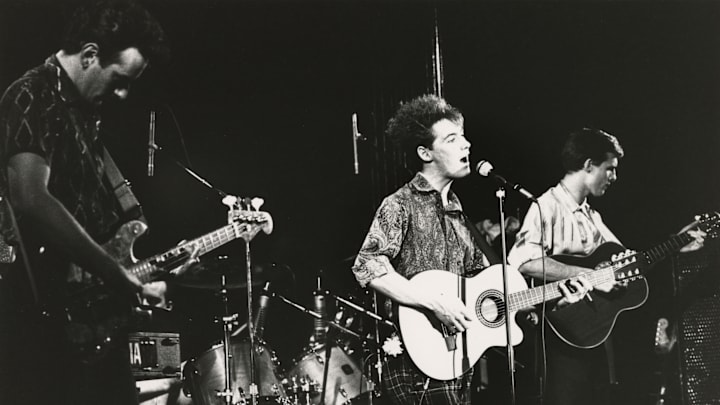1985
Strike Lightning Strike by Lonnie Mack
Let’s double dip on the southern blues with Tennessee’s (by way of Indiana) Lonnie Mack. Mack had been cranking out no-frills electric blues with his trademark whammy effect for twenty years when he got together with the legendary Stevie Ray Vaughan to produce his eighth studio album. He opens with the hard rocking blues of “Hound Dog Man” and then adds Motown-esque backing vocals to the flat-out jam of “Satisfy Susie.”
Vaughan shares guitar with Mack throughout, never more thrillingly than on the instrumental burner “Double Whammy.” They turn acoustic for the closing track, “Oreo Cookie Blues,” which could come directly from the delta, teeming with its double entendre. “If You Have to Know,” which gets a vocal assist from Vaughan, is an instant blues classic.
Steve McQueen by Prefab Sprout
Known in the USA as Two Wheels Good so as not to run afoul of the titular actor, Prefab Sprout opens their wiry pop sophomore album with a song named for another North American, “Faron Young,” which references the country singer’s “Four in the Morning.” It might be hard to see any link between the art rockers from northeast England and the Hillbilly Heartthrob from the American South. But there is a theatricality – a lushness – to the sounds that both artists played with.
Thomas Dolby produced the album and he was a natural to bring out the delicate grandiosity that runs through singer Paddy McAloon’s compositions. With keyboardist Wendy Smith providing heavenly backing vocals, romantic ballads like “When Love Breaks Down” and “Desire As” positively glimmer. But there’s just enough of an edge on equally successful pop tunes like “When the Angels” and “Blueberry Pies” to keep McAloon’s more precious impulses in check.
Suzanne Vega by Suzanne Vega
Her second album – Solitude Standing – would be Vega’s primary introduction to the world, with its one-two opening punch of “Tom’s Diner” and “Luka.” But that quirky sense of both lyric and melody – that ability to be heavy and light, funny and serious – was readily apparent on Vega’s self-titled debut. The breezy-yet-wise “Marlene on the Wall” is simply a great double-sided pop song. And she could do great mid-tempo rockers like “Neighborhood Girls,” aided by producer Steve Addabbo’s guitar and the slide of Frank Christian.
Vega is equally at home with the tricky rhythms of her more atmospheric compositions like “Freeze Tag” (which, like “Marlene on the Wall,” references Marlene Dietrich) and the hypnotic “Small Blue Thing.” She can be jagged on a song like “Straight Lines” or tell a simple, old-fashioned romantic story as in “The Queen and the Soldier.”
Vega’s best songs always have a touch of tragedy – sometimes more than a touch – but her melodic sense is so sure that things never grow overbearing. That would be the key to “Luka” a few years later, but it is right there on her first album.
Who’s Missing by the Who
Let’s close this list with a collection of odds and sods from one of the biggest rock bands of the previous two decades. In the ‘70s, the Who had released several successful compilations of early singles and assorted other outtakes. 1971’s Meaty Beaty Big and Bouncy and 1974’s Odds & Sods largely grew out the band’s immense popularity. A decade later, things were very different.
Two tragedies had derailed the band – particularly primary songwriter Pete Townsend. In 1978, singular drummer Keith Moon died. The band continued with Kenney Jones on drums, but a year later, a catastrophe at a show in Cincinnati resulted in the death of eleven concert-goers. Townsend would write songs for two more albums before calling it quits in 1983.
With no new Who music coming, MCA gathered up a bunch of old material and put out Who’s Missing. If we’re being honest, the collection is uneven, but uneven Who is still loads of fun. They do a cranked-up version of “Barbara Ann,” along with songs by Roger Daltrey (“Here for More”) and John Entwhistle (“When I was a Boy.”) Best of all, a couple of minor Townsend classics – “Mary Ann with the Shaky Hands” and the grandiose, subversive “I’m a Boy” – hold down the center of the album.
